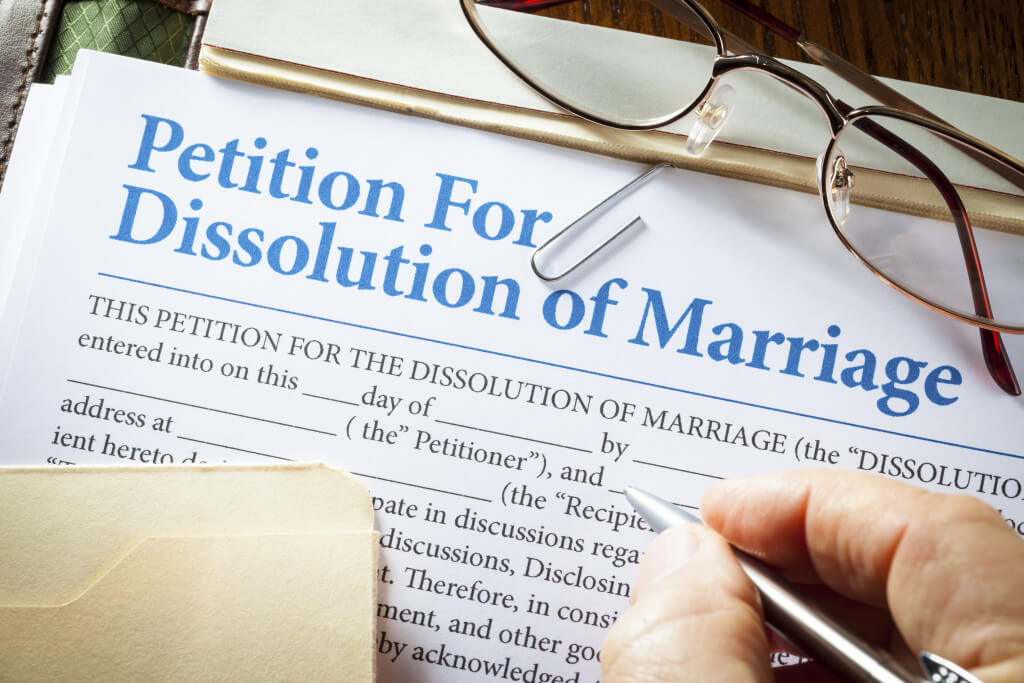The uncontested divorce process is a popular choice for couples seeking to dissolve their marriage without the complications of a lengthy court battle. This method may provide a quicker, more cost-effective and less emotionally taxing solution for those looking to separate from their partner as both individuals collaborate in order to reach an agreeable outcome concerning all divorce matters.
However, not every case is suited for an uncontested divorce. In this blog post, we will explore various aspects of the process such as initiating the divorce proceedings with or without your spouse’s consent and legally serving papers to an unwilling partner. We will also delve into contested divorce scenarios and discuss how irreconcilable differences can be proven in court.
Furthermore, effective communication strategies during separation are essential in order to avoid unnecessary conflict while ensuring clarity about intentions. Our expert advice will help you navigate through these challenging times by applying pressure through legal means when necessary and leveraging negotiation techniques during settlement discussions.
Last but not least, managing emotions throughout the uncontested divorce process plays a crucial role in achieving favorable outcomes. Seeking professional support like therapy or counseling can greatly benefit one’s emotional well-being during this period. Finally, preparing for life after divorce involves establishing a post-divorce budget plan, finding suitable housing arrangements if necessary, and developing effective co-parenting strategies when children are involved.
Table of Contents:
- Initiating the Divorce Process
- Contested Divorce Scenarios
- Communication During Separation
- Communication During Separation
- Applying Pressure through Legal Means
- Managing Emotions Throughout The Process
- Preparing For Life After Divorce
- FAQs in Relation to Uncontested Divorce Process
- Conclusion
Initiating the Divorce Process
Once the decision to divorce a partner who is unwilling has been made, the initial move should be submitting paperwork and guaranteeing it is provided in an accepted legal form. This will set things in motion, regardless of your spouse’s resistance.
Filing for Divorce with or without Your Spouse’s Consent
To initiate an uncontested divorce process, you need to file a petition for dissolution of marriage at your local courthouse. In most states, it is not necessary to have both parties’ consent; one person can file for divorce unilaterally. However, some jurisdictions may require that you live separately from your spouse before filing.
- Complete all required forms: These typically include financial affidavits and parenting plans if children are involved.
- Petition fee: Pay any applicable fees associated with filing for divorce.
- Court clerk review: The court clerk will review your paperwork and ensure everything is complete before accepting it.
Legally Serving Divorce Papers to an Unwilling Partner
Serving papers on an unwilling partner might be challenging but essential since this ensures they receive notice about the impending legal action. It also provides them with their due process rights under family law statutes. There are several methods available when serving papers:
- In-person service by sheriff or private process server: This involves having someone physically deliver copies of filed documents directly to your spouse according to state requirements (e.g., at their residence or workplace).
- Service by mail: You can send the divorce papers via certified mail with a return receipt requested. This provides proof that your spouse received the documents.
- Publication service: If you cannot locate your spouse, some states allow for service by publication in a local newspaper after obtaining court permission. However, this method is generally reserved as a last resort.
In any case, it’s crucial to follow all legal requirements when serving papers on an unwilling partner to avoid delays and complications later in the process. Consulting with an experienced family law attorney like those at Buchanan Law Group will ensure you are taking appropriate steps throughout this challenging time.
Filing for divorce may be a challenging undertaking, but with the correct advice and prep it can be initiated. When there are legal disputes that arise from your partner’s unwillingness to accept service of papers, contested divorce scenarios may become necessary in order to move forward with dissolving the marriage.
Important Takeaway:
To initiate an uncontested divorce process, file a petition for dissolution of marriage at your local courthouse and complete all required forms. Ensure that the papers are legally served to your spouse through in-person service by sheriff or private process server, service by mail, or publication service as a last resort. It’s crucial to follow all legal requirements when serving papers on an unwilling partner to avoid delays and complications later in the process.
Contested Divorce Scenarios
If your spouse is unwilling to accept the divorce and finds a lawyer willing to dig their heels in, expect that your divorce will proceed like any contested case. Despite this potential obstacle, remember that you only need irreconcilable differences as grounds for ending the marriage.
Preparing for Possible Delays Due to Legal Disputes
In a contested divorce scenario, it’s essential to be prepared for possible delays due to legal disputes. Your spouse may attempt various tactics such as requesting additional documentation or disputing property division. To minimize these delays, ensure you have all necessary documents readily available and work closely with your attorney who can help anticipate any potential roadblocks.
Understanding How Irreconcilable Differences Can Be Proven
To demonstrate irreconcilable differences as the cause of a divorce, one must present evidence that indicates an inability to resolve any major marital issues through counseling or other methods. Some examples include infidelity, financial irresponsibility, substance abuse issues, or constant arguing over trivial matters. It’s important to gather relevant documentation (such as emails or text messages) and present them in court if needed. Your attorney can provide guidance on what specific evidence would best support your claim of irreconcilable differences.
Communication During Separation
Maintaining open lines of communication with your soon-to-be ex-spouse during separation and pending divorce proceedings is crucial. A savvy attorney can provide guidance on how best to communicate so they understand there is no hope for reconciliation while avoiding unnecessary conflict.
Tips from Attorneys on Effective Communication Strategies
- Use a neutral tone: Avoid using accusatory or hostile language when discussing divorce-related matters.
- Stay focused on the issue at hand: Do not bring up past grievances or unrelated issues during conversations about the divorce process.
- Keep emotions in check: It’s natural to feel upset, but try to remain calm and composed during discussions with your spouse.
Ensuring Clarity About Intentions While Avoiding Unnecessary Conflict
To ensure clarity about your intentions while avoiding unnecessary conflict, consider utilizing a third-party mediator or communication platform designed for divorcing couples. These services can help facilitate productive conversations and minimize misunderstandings that may arise from emotionally charged exchanges. A professional mediator can also assist in resolving disputes more efficiently by providing an unbiased perspective and guiding both parties towards mutually beneficial solutions. To find a qualified mediator near you, consult resources such as the Mediate.com directory.
Anticipating potential delays and legal issues in a contested divorce is critical to successful separation proceedings, so communication strategies should be carefully considered. To ensure your separation process goes smoothly, it is also essential to understand how communication strategies should be implemented during the separation period.
Important Takeaway:
Divorces can be contested if one spouse refuses to accept it, causing legal disputes and delays. To prove irreconcilable differences as grounds for divorce, evidence of significant marital problems must be presented in court. Effective communication strategies such as using a neutral tone and staying focused on the issue at hand can help minimize unnecessary conflict during separation proceedings.
Communication During Separation
It is essential to maintain clear communication with your ex-spouse during this period of separation and divorce proceedings, for which an experienced lawyer can provide advice on how best to do so. A savvy attorney can provide guidance on how best to communicate so they understand there is no hope for reconciliation. This section will discuss tips from attorneys on effective communication strategies, as well as ensuring clarity about intentions while avoiding unnecessary conflict.
Tips from Attorneys on Effective Communication Strategies
When dealing with an unwilling spouse in a divorce, it’s crucial to establish clear and respectful communication channels. Here are some tips recommended by experienced family law attorneys:
- Stay calm and composed: Even if emotions run high, always try to remain level-headed when discussing the divorce process with your spouse.
- Avoid blame or accusations: Focus on expressing your feelings and needs without pointing fingers or making accusations against your partner.
- Prioritize written communication: Using email or text messages allows both parties to have a record of the conversation and helps avoid misunderstandings.
- Seek legal advice before sharing information: Consult with your attorney before disclosing any sensitive details about assets, finances, or custody arrangements.
Ensuring Clarity About Intentions While Avoiding Unnecessary Conflict
Maintaining transparency about your intentions throughout the uncontested divorce process is essential; however, doing so without causing additional tension can be challenging. Consider these suggestions for striking a balance between being honest and preventing conflicts:
- Create boundaries: Determine which topics should be discussed directly between you two (e.g., parenting decisions) and which should be handled by your respective attorneys (e.g., asset division).
- Use neutral language: Avoid using loaded words or phrases that may trigger negative emotions in your spouse.
- Reiterate the reasons for divorce: Gently remind your spouse of the irreconcilable differences that led to this decision, emphasizing that it’s best for both parties to move forward separately.
In some cases, a professional mediator can help facilitate communication between you and your unwilling spouse. A skilled mediator will guide discussions on contentious issues while maintaining an impartial stance. You can find more information about mediation services through resources like the Mediate.com directory.
Maintaining open lines of communication with an unwilling partner during an uncontested divorce process is crucial to reaching a resolution as smoothly as possible. By following these tips and seeking guidance from experienced family law professionals, you’ll be better equipped to navigate this challenging time effectively.
Respectful and constructive communication during separation can be pivotal in the outcome of your divorce proceedings, so it is essential to keep this in mind. Applying pressure through legal means may help you achieve the desired result in negotiations with your spouse; however, it is best done under advisement from an experienced family law attorney.
Important Takeaway:
During a separation and pending divorce proceedings, it’s important to maintain open communication with your soon-to-be ex-spouse. Family law attorneys recommend staying calm, avoiding blame or accusations, prioritizing written communication, seeking legal advice before sharing information and creating boundaries while using neutral language to ensure clarity about intentions without causing additional tension. In some cases, professional mediators can help facilitate communication between you and your unwilling spouse.
Applying Pressure through Legal Means
Having an attorney with legal expertise can be invaluable in a situation where one spouse is not amenable to the divorce process. An experienced attorney can apply pressure on an unwilling party by utilizing various tactics within legal boundaries. These methods may help expedite the process and encourage cooperation from both sides even when one person does not wish to end their marriage.
Leveraging Negotiation Techniques during Settlement Discussions
Negotiating with an uncooperative spouse can be challenging, but there are strategies that your attorney can employ to facilitate progress. For example, they might suggest interest-based negotiation techniques, which focus on identifying each party’s underlying needs and interests rather than arguing over positions or demands. By employing strategies such as interest-based negotiation, open communication and problem-solving can be promoted in order to reach a resolution that both parties are satisfied with.
- Mediation: In some cases, involving a neutral third-party mediator can help facilitate productive discussions between spouses who cannot agree on certain issues. Mediators are trained professionals who guide couples toward finding common ground while maintaining impartiality throughout the process.
- Court-ordered settlement conferences: If negotiations stall despite efforts at mediation or other alternative dispute resolution methods, courts may order mandatory settlement conferences where judges provide guidance in reaching agreements before proceeding further into litigation.
Employing Court Motions and Other Tools Available under Family Law Statutes
Your attorney also has access to various court motions that could compel action from an uncooperative spouse or force them into compliance with specific requirements of family law statutes. Some examples include:
- Temporary orders: If your spouse is refusing to provide financial support or comply with child custody arrangements, your attorney can file a motion for temporary orders. These court-ordered directives require the non-compliant party to fulfill certain obligations while the divorce proceedings are ongoing.
- Motions for contempt: If your spouse violates any existing court orders or agreements during the divorce process, they may be held in contempt of court. This could result in fines, penalties, and even jail time if their behavior continues unabated.
In addition to these legal tactics, it’s important to remember that communication remains crucial throughout this challenging time. Your attorney can help you navigate difficult conversations with an uncooperative spouse by providing guidance on how best to communicate so they understand there is no hope for reconciliation.
Ultimately, having a skilled lawyer who understands both negotiation techniques and family law statutes will prove invaluable when dealing with an unwilling partner during the divorce process. By employing these strategies within legal boundaries and maintaining open lines of communication, you’ll increase your chances of reaching a fair resolution as quickly as possible.
Using the law to bring pressure can be an efficient way of making sure both sides take responsibility and reach a mutually agreeable conclusion. Managing emotions throughout the process can be equally as important in order to maintain mental clarity during this difficult time.
Important Takeaway:
When dealing with an uncooperative spouse during the divorce process, a skilled lawyer can apply legal pressure and utilize negotiation techniques to encourage cooperation. Mediation or court-ordered settlement conferences may also be employed. Legal tools such as temporary orders and motions for contempt are available under family law statutes to compel action from the non-compliant party. Communication remains crucial throughout this challenging time, and open lines of communication should be maintained between both parties.
Managing Emotions Throughout The Process
Dealing with emotions is crucial during a contentious split where one partner wants out but another refuses; it’s essential not just for personal well-being but also successful resolution outcomes overall since heightened feelings often hinder progress more than anything else. In this section, we will discuss the importance of seeking professional support and recognizing the impact of emotions on decision-making during divorce proceedings.
Seeking Professional Support Like Therapy or Counseling for Emotional Well-Being
Taking care of your emotional health should be a priority throughout the divorce process. A licensed therapist or counselor can provide valuable guidance and support as you navigate through these challenging times. They can help you develop coping strategies to manage stress, anxiety, anger, and sadness that may arise due to your spouse’s unwillingness to cooperate in the divorce process.
- Cognitive-behavioral therapy (CBT): This type of therapy focuses on identifying negative thought patterns and replacing them with healthier ones to improve emotional well-being.
- Support groups: Joining a local or online support group allows you to connect with others who are going through similar experiences, providing comfort and understanding.
- Meditation: Practicing mindfulness techniques like meditation can help reduce stress levels by promoting relaxation and self-awareness.
Recognizing the Impact of Emotions on Decision-Making During Divorce Proceedings
Your emotions can significantly influence how you make decisions during your divorce case. For example, if you’re feeling angry towards your spouse for refusing to agree on an uncontested divorce, it might lead you into making impulsive choices that could negatively impact the outcome of your case. To avoid this, it’s essential to:
- Take a step back: When you’re feeling overwhelmed by emotions, take a moment to pause and reflect on the situation objectively.
- Consult with your attorney: Your lawyer can provide valuable advice and guidance based on their experience in handling similar cases. They can help you make informed decisions that align with your best interests.
- Avoid making hasty decisions: Give yourself time to process information before making any major choices during divorce proceedings. This will allow you to consider all possible outcomes and consequences more thoroughly.
In conclusion, managing emotions throughout an uncontested divorce process is crucial for both personal well-being and achieving successful resolution outcomes. By seeking professional support like therapy or counseling and recognizing the impact of emotions on decision-making during divorce proceedings, you’ll be better equipped to navigate through these challenging times while maintaining control over your emotional health.
Managing emotions throughout the process of a divorce can be difficult, but having professional support and understanding how your feelings may affect decisions is key. Preparing for life after divorce requires careful planning to ensure that you are financially secure and have suitable housing arrangements if necessary.
Important Takeaway:
Managing emotions is crucial during an uncontested divorce process. Seeking professional support like therapy or counseling and recognizing the impact of emotions on decision-making can help you navigate through these challenging times while maintaining control over your emotional health. Taking care of your emotional well-being should be a priority throughout the divorce process, as it can significantly influence how you make decisions during your case.
Preparing For Life After Divorce
As you move forward with your life after divorcing someone who didn’t want to let go, it’s essential to plan and prepare for new beginnings. This includes addressing financial matters, living arrangements, and any potential co-parenting responsibilities. By taking the necessary steps now, you can set yourself up for a successful transition into your post-divorce life.
Establishing a Post-Divorce Budget and Financial Plan
The financial repercussions of divorce can be daunting, yet forming a budget is an essential move to reclaiming authority over your money. Start by listing all sources of income (including alimony or child support) and expenses such as housing costs, utilities, groceries, insurance premiums, and debt payments. Be sure to account for any changes that may occur due to the divorce settlement agreement like spousal support or division of marital property.
- Evaluate your current spending habits and identify areas where adjustments are needed.
- Create a realistic monthly budget based on your new financial situation.
- If necessary, consult with a financial advisor or planner for guidance on managing assets and investments post-divorce.
Finding Suitable Housing Arrangements if Necessary
In many cases following an uncontested divorce process where one spouse disagrees about ending the marriage, finding suitable housing becomes crucial during this time period, especially when children are involved and require stability within their lives. Here are some tips to help ensure a smooth transition:
- Determine your housing needs, such as size, location, and affordability.
- Research the local rental or real estate market to find options that fit your criteria.
- If possible, schedule a visit to potential homes before making any decisions.
Remember that while it may be tempting to rush into a new living situation after an emotionally draining divorce process, taking the time to carefully consider your options will lead to better long-term outcomes for both you and any children involved in this transition period.
Developing Effective Co-Parenting Strategies When Children Are Involved
Co-parenting after divorce can be challenging but is essential for maintaining stability and consistency in the lives of children affected by separation. The key lies within open communication lines between both parties involved so they understand their responsibilities regarding child custody arrangements like visitation schedules or support payments required under court orders issued during final divorce judgment proceedings:
- Create a parenting plan outlining each parent’s roles and responsibilities related to childcare duties such as transportation, school events attendance among others aspects which need attention post-separation from one another.
- Maintain open lines of communication with your ex-spouse about scheduling changes or other issues affecting co-parenting efforts – always keeping best interests at heart when making decisions together on behalf of these young individuals impacted most directly through family law matters concerning contested divorces versus uncontested ones where cooperation exists more readily overall.
Important Takeaway:
Preparing for life after an uncontested divorce process involves planning and preparing for new beginnings. This includes establishing a post-divorce budget, finding suitable housing arrangements if necessary, and developing effective co-parenting strategies when children are involved. It’s important to take the necessary steps now to set yourself up for a successful transition into your post-divorce life.
FAQs in Relation to Uncontested Divorce Process
How Long Does an Uncontested Divorce Take in the US?
An uncontested divorce typically takes between 3 to 6 months to finalize, depending on the state and county where it is filed. This time frame includes a mandatory waiting period that varies by jurisdiction. For example, some states require a 30-day waiting period while others may have longer requirements.
How Much Does an Uncontested Divorce Cost in Kansas?
In Kansas, filing fees for an uncontested divorce range from $150 to $200, depending on the county. Additional costs may include attorney’s fees if you choose legal representation; however, many couples opt for self-representation in simple cases with no disputes over assets or child custody arrangements.
How Long Does an Uncontested Divorce Take in NY?
In New York State, an uncontested divorce usually takes around three months to complete once all necessary paperwork has been submitted and properly served. The process can be expedited if both parties agree on all terms of their separation and cooperate fully throughout the proceedings.
What Is the Quickest Divorce You Can Get?
The quickest divorces are generally those classified as “uncontested,” meaning both spouses agree on all issues related to their separation. In some states like Nevada or Idaho with short residency requirements and minimal waiting periods (as little as 20 days), a quick resolution might be possible within one month after filing.
Conclusion
Going through a divorce can be a difficult and emotional process, but understanding the uncontested divorce process can help make it smoother. Initiating the process, preparing for possible delays in contested scenarios, effective communication strategies, applying pressure through legal means, managing emotions throughout the proceedings, and preparing for life after divorce are all important steps to take.
At Buchanan Law Group, we understand that each client’s situation is unique. At RBB Firm, our legal experts can help you traverse the uncontested divorce process with efficiency and efficacy while safeguarding your rights.
If you need assistance with an uncontested divorce or have any questions about our services, please contact us.








